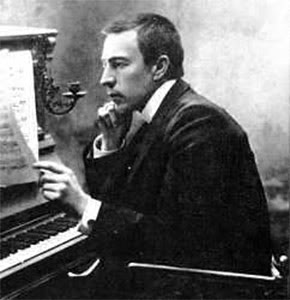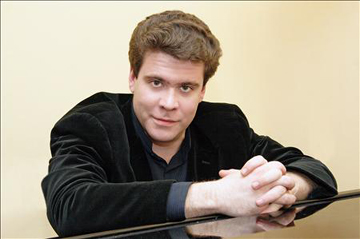A Russian composer’s breakdown and recovery, all in 105 minutes
The richly melodic music of Sergei Rachmaninoff remains a summer programming staple, and a guaranteed way of packing in the masses, as was the case once again Wednesday night at Ravinia.
Yet James Conlon found a way to provide some artful backspin on Rachmaninoff by programming the two works that led to the composer’s breakdown and his psychological and artistic recovery.
Rachmaninoff’s life was a string of unbroken successes until the disastrous premiere of his Symphony No. 1 in 1897. The audience catcalls and scathing reviews plunged the 22-year-old composer into a deep depression that continued for three years, during which he wrote little. Only a course of psychoanalysis and hypnosis with a Dr. Dahl brought Rachmaninoff out of the slough of despond, and the resulting work, his Piano Concerto No. 2, was gratefully dedicated to Dahl. (Another more subtle tribute may be the prominence of the viola section; Dahl was an amateur violist.)
The sprawling First Symphony is an odd work in the composer’s output. There are flashes of Rachmaninoff’s melodic style yet the lyrical qualities are overshadowed by a nervous, haunted qualitiy, such as the dour restlessness of the opening theme and the grinding repeated chords of the finale, hardly an affirmative coda. (His Dies irae fixation also makes a guest appearance.)
A work this complex requires more rehearsal time than is possible on a tight summer schedule, and one couldn’t help feeling that many of the score’s details went unexplored.
That said, Conlon showed a firm overall feel for this dark, nerve-wracked music and led a fiery, combustible performance that put across the explosive outbursts, rhythmic instability and sheer strangeness effectively. Even with most of the CSO principals off in the festival’s waning weeks, the orchestra rose to the occasion with notably gleaming and powerful playing, the CSO brass, in particular, sounding like its old technically assured and cohesive self.
Rachmaninoff’s Second Piano Concerto is, of course, a much better-known commodity. Even though this warhorse suffers from overfamiliarity, one had great hopes for Wednesday’s performance by Denis Matsuev. The strapping Russian soloist launched the opening chords with a laser-like concentration and acutely calibrated dynamics that promised a traversal of power and eloquence.
Power was certainly there in abundance with Matsuev blazing through the knuckle-busting difficulties faultlessly. Rarely will one hear the octaves thrown off with such muscle and effortless ease, and the pianist’s stainless-steel bravura culminated in a thrilling coda, sending the Ravinia audience into paroxysms.
But for all the virtuosity, Matsuev’s playing seemed to miss the essential lyric heart of the music. The Adagio was all on the surface—poised and clear, yet blank in feeling and expression, with Matsuev’s hard, emphatic phrasing and mezzoforte dynamics sounding oddly removed from what the music is all about.
Conlon and the CSO seemed more in synch with this uber-Romantic music than their soloist, with the conductor leading a richly textured, responsive accompaniment. The CSO viola section was at their finest and Daniel Gingrich’s horn solos also provided a highlight.
Denis Matsuev will perform a recital at Ravinia’s Martin Theatre 8 p.m. Thursday including music of Chopin, Schumann and Prokofiev. www.ravinia.org
Posted in Uncategorized







Posted Aug 02, 2010 at 4:23 am by Sebastian
The second piano concerto is one of my favorite Rachmaninov pieces, but as seems to have been the case here it’s often difficult for soloists to perform with technical accuracy AND portray the sensitivity and opulence of the music. But surely the precision and force of Matsuev’s playing must be noted and applauded, even if it lacked depth?